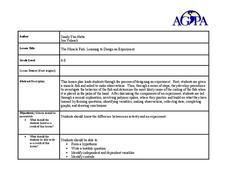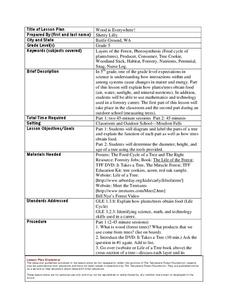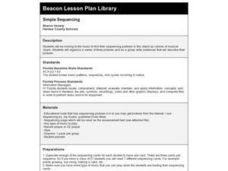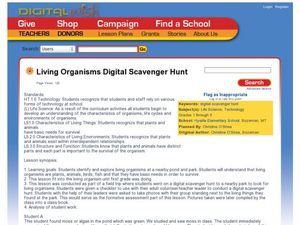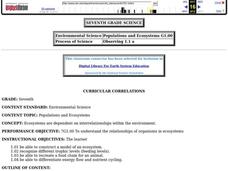Curated OER
Earth Science: The Sun-Earth Relationship
Students examine the sun's impact on the Earth. They read online articles, explore various websites, and answer questions using information found on the Internet.
Curated OER
The Miracle Fish: Learning to Design an Experiment
Learners develop procedures to explore the behavior of fish. In this scientific experiment lesson students from a hypothesis, write a question, identify different variables and controls in their experiment.
Curated OER
Viruses
In this biology lesson, students complete a crossword puzzle with 35 questions about viruses. They identify the different types of viruses and the diseases they bring.
Curated OER
Observing Pods
Middle schoolers observe the pistil growing into a tiny string bean-like seed pod. They then observe the development of the fertilized pods between Day 17 and Day 35 and record their observations by drawing and labeling, writing, and...
Curated OER
People-Growing and Changing
Second graders study how people grow and change. In this health lesson, 2nd graders describe how they have changed over the years and guess who each student is after looking at everyone's baby pictures.
Curated OER
Environmental Conditions: Friend or Foe
Students research and answer questions on how organisms are classified and how their needs are met through their environment. They work in small groups and create a poster, chart, rap, PowerPoint, or brochure demonstrating how organisms...
Curated OER
Mushroom Prints
Students create a mushroom spore design on paper while studying the facts on fungi.
Curated OER
Window Gardens
High schoolers use a plastic sandwich bag containing a damp paper towel taped to a window as a model system to observe the germination and early growth of radish seeds. They are challenged to pose a question about seed germination and...
Curated OER
Wood is Everywhere!
Fifth graders diagram and label the parts of a tree. For this lesson on how trees obtain food, 5th graders diagram and label the parts of a tree, and determine the diameter, height, and age of a tree.
Curated OER
Simple Sequencing
Fourth graders play a stand up version of musical chairs to find their sequencing partners. In this music and language arts lesson, 4th graders enjoy a game that requires them to organize a series of three pictures, then write sentences...
Curated OER
Water and Ice
Young scholars explore water as it changes states of matter. In this physical property lesson, students use observation, measurement, and communication skills to describe changes in water as it goes from a solid to a liquid and back again.
Curated OER
What's In The Forest?
Students examine forest food chains and create a forest habitat in the classroom. They are introduced to the concept of interdependence in Nature. They define a simple forest food chain and develop inquiry process skills.
Curated OER
Living Organisms Digital Scavenger Hunt
Students photograph living organisms. In this plan for a field trip, students go to a local park or pond and photograph themselves with various living organisms on their scavenger hunt list. The photographs taken are compiled into a...
Curated OER
Populations and Ecosystems
Seventh graders create a model of an ecosystem and label it to show structure and function. They research the food web of an aquatic animal and also trace energy flow from the primary producer up the food chain.
Curated OER
Can You Beat Jet Lag?
Learners examine the health condition of jet lag. Using mealworms, they test the effect of light on the development of them into adults. They answer discussion questions and examine the relationship of age and one's activity level.
Curated OER
Keeping Warm
Learners participate in an online activity to determine how objects heat and cool. They determine what objects best serve as thermal insulators.
Curated OER
Pushes and Pulls
Students recognize different types of movement and causes that my affect the movement. They know that pushes and pulls are types of forces.
Curated OER
Using Electricity
Students name appliances that use electricity. They construct a simple electrical circuit. They predict whether a circuit work. They name components of an electrical circuit.
Curated OER
Keeping Healthy
Students exercise their muscles to explore concept of heart rate and to explain how blood supplies muscles with oxygen.
Curated OER
Magnets and Springs
Students participate in an online lesson making and recording observations of magnets. They determine that magnets attract some metals but not others and that other materials are not attracted to magnets.
Curated OER
Light and Shadows
Learners participate in an online lesson to determine how light travels from a source, and to explain that shadows form when light travelling from a source is blocked.
Curated OER
Mercury in the Environment
Students develop abilities necessary to do scientific inquiry. They develop an understanding of chemical reactions, structures and properties of matter. They develop decision-making skills in natural and human-induced hazards.
Curated OER
Forces and Movement
Students examine types of forces and movements. They identify different causes that can affect movement and speed. They create their own predictions about they believe to be the outcome of an experiment.
Other popular searches
- Life Cycle of a Plant
- Plant Animal Life Cycles
- Plant Lifecycle
- Life Cycle of Plant
- "Life Cycle" Plant
- Plant, Animal Life Cycles
- Life Cycle Plant
- Life Cycle Bean Plant
- Life Cycle Flowering Plant
- Life Cycle of a Bean Plant
- Science Life Cycle of a Plant
- Life Cycles of a Plant



